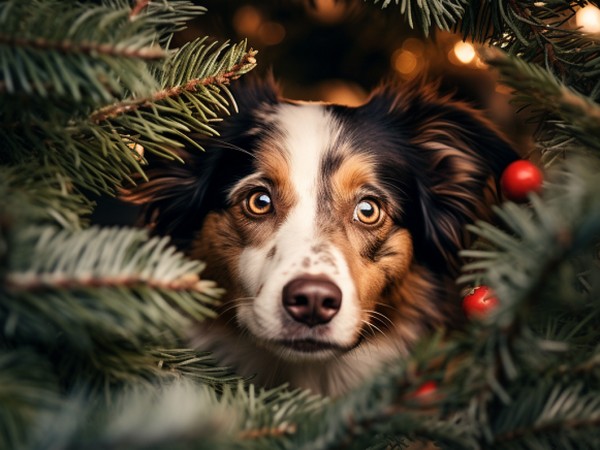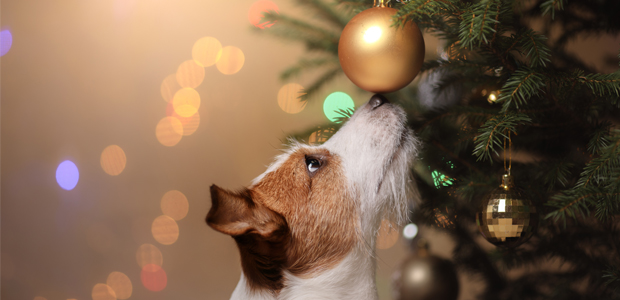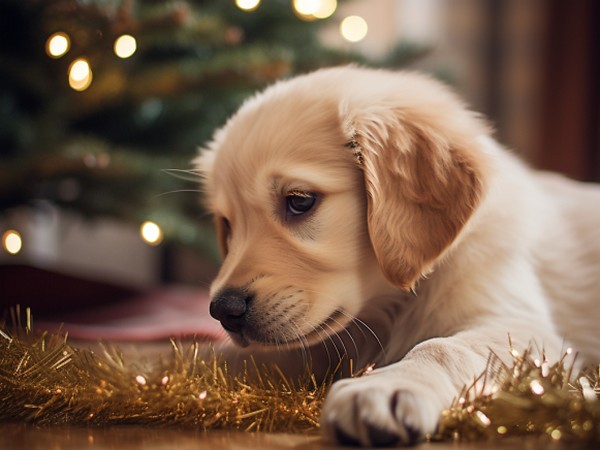Are Christmas trees poisonous to dogs?
A bright and beautiful Christmas tree can be the perfect antidote to dreary winter evenings, and as far as we’re concerned, it’s never too early to put up your Christmas decorations.
But for dog owners, it’s important to understand the dangers Christmas trees can pose to your dog.
Are Christmas trees safe for dogs?

Christmas trees are a great addition to any home, so it’s only natural for pets to be curious. Filled with interesting scents, glistening decorations and twinkling lights, it’s not hard to see why they might be attracted to Christmas trees.
Christmas trees tend to be either fir, spruce or pine. These are all non-toxic to dogs and cats.
However, while the trees aren't toxic, their needles can still harm your dog. They can be uncomfortable if they get stuck in your dog's paws and a choking hazard if they end up in your dog's throat. If your dog ends up ingesting needles, they could suffer from stomach problems. It's not just the physical discomfort; the oils in the needles can irritate their mouth and stomach lining. If a large number are ingested, it could lead to more serious digestive issues, including blockages or perforations in the intestines, which would require emergency vet care.
Keeping your dog safe around Christmas trees
Tree placement
To keep your dog safe, think about where your tree will go. Placing your tree in a corner and blocking access is a good idea. This protects your dog and helps prevent the tree from being knocked over. You could also use a pet gate or a decorative fence to keep your dog away.
Clean up the needles
Regularly vacuuming fallen needles can also help reduce the risk of your dog ingesting them. This is especially important if you have a young or curious dog who might be tempted to explore the tree. A daily check to pick up any fallen needles will keep your dog safe.
Dirty water
Be cautious about the water in the tree stand. This water can collect sap, bacteria, and any harmful preservatives used to keep the tree fresh, which can be toxic if your dog drinks it. Covering the stand with a tree skirt or a covered tree stand can prevent your dog from drinking dangerous water.
Artificial trees
Artificial trees often have softer, less sharp needles that won’t come off as easily as those on a real tree. This eliminates the risk of your dog ingesting real pine needles.
However, be mindful that some dogs might still be tempted to chew on branches of artificial trees, so keep an eye on them.
Read more: A pet-friendly Christmas in 16 steps

Are Christmas decorations dangerous to dogs?
Yes, some Christmas decorations can be dangerous to dogs. Decorating your Christmas tree with tinsel and lights is a tradition in many homes, but these can pose health risks.
Tinsel
Tinsel can be irresistible to dogs, especially puppies and younger dogs.
But tinsel is not just a choking hazard; it's far more dangerous if ingested. Once swallowed, tinsel can get tangled in the dog's intestines, leading to a condition known as a linear foreign body. This can cause severe intestinal blockages, which might not only require surgery but can also be fatal.
The best way to prevent this is to avoid using tinsel altogether. If you really can't imagine your tree without tinsel, place it high up where your dog can't reach it, don’t ever play with your dog with tinsel, and never leave your dog alone in the room with the tree.
Christmas lights
While not as enticing as tinsel, Christmas lights still pose a risk to your dog. They might chew on the wires, leading to electric shocks or burns. This is particularly a concern with puppies who are teething and prone to chewing.
To lower this risk, ensure your lights are securely fastened to the tree and out of your dog's reach. Use cable protectors for any exposed wires, or run the wires through PVC pipes. It's also a good idea to unplug the lights when you're not in the room, just to be safe.
Regularly check your Christmas lights for any signs of damage or wear and tear. Frayed wires, broken bulbs, or loose connections not only pose a risk to your dog but are also a fire hazard. If you notice any damage, replace the lights immediately. LED lights are safer as they don't heat up as much as traditional bulbs, reducing the risk of burns if touched.
Unstable tree
A falling tree can hurt your dog, break lights, and create chaos. Ensure it's stable and won't easily tip over if your dog bumps or jumps into it. Consider tying it to something sturdy as an extra precaution.
Read more: The 7 best Christmas gifts for cats

Other Christmas dangers
Wrapping paper, bows, and ribbons scattered around might look like an invitation to play for a curious puppy, but these items can be surprisingly dangerous.
Wrapping paper
While it might not seem harmful, wrapping paper can cause issues if your dog ingests it. Some wrapping papers may contain dyes or chemicals that are toxic to dogs.
If your dog swallows a large amount of wrapping paper, it can lead to intestinal blockages, causing severe discomfort and potentially requiring surgery.
The crinkling sound of wrapping paper can be particularly enticing to dogs, encouraging them to chew and tear it apart, so make sure you dispose of any wrapping paper straight away.
Bows and ribbons
Bows and ribbons present a similar risk, especially when chewed into smaller pieces, and can easily be swallowed by dogs. Once ingested, they can cause choking or become entangled in the intestines, leading to a linear foreign body like tinsel. This is particularly concerning with ribbons and stringy materials, as they can cause severe damage to your dog's intestines. To keep your dog safe, watch them and ensure they don't start playing with or chewing on these items.
Having a designated area for your dog to relax in is also a good idea, away from the excitement and potential hazards. This could be a quiet room or crate with their bed, favourite toys, and some water, where they can retreat if the festivities become overwhelming.
Safer alternatives
Consider less appealing or hazardous alternatives if you're using ribbons and bows for decoration or on presents. Fabric bows or reusable cloth wrappings can be a safer choice. Also, be mindful of where you dispose of these items. A securely closed bin or a high shelf can ensure these tempting items are out of your dog's reach.
Read more: Christmas plants that are toxic to dogs (and some safe alternatives)
Ornaments
Ornaments are essential to the festive charm of Christmas, but they can pose significant risks to dogs.
Glass ornaments
Glass ornaments are particularly hazardous. If these ornaments break, the resulting shards can cause serious injuries. Dogs might step on or even ingest these small pieces of glass, leading to internal injuries or blockages.
To reduce this risk, consider using shatterproof ornaments or placing glass ornaments higher up on the tree, out of your dog's reach. It's also important to regularly check around the tree for any fallen decorations to prevent accidents.
Small ornaments
Small and chewable ornaments present another danger. These ornaments can be a choking hazard for dogs, especially curious puppies who might try to chew on or play with them. If swallowed, they can cause intestinal blockages, a serious condition that often requires surgical intervention.
When choosing ornaments, it's wise to consider their size and material. Choose larger, less chewable decorations and ensure they are securely fastened to the tree to prevent them from becoming a plaything for your dog.
Edible ornaments
Edible ornaments, such as those made from chocolate or other food items, are especially tempting but dangerous. Chocolate, for instance, is toxic to dogs and can cause various health issues, ranging from digestive upset to more severe symptoms like seizures.
These edible decorations should be placed well out of your dog's reach, and it's crucial to inform family members, particularly children, about the dangers of sharing these treats with pets.
Salt dough ornaments
Salt dough, often used for homemade ornaments and crafts, can be very dangerous for pets if they eat it. Mixing flour, salt, and water can lead to salt toxicosis, a serious condition.
Salt toxicosis happens when there's too much salt in the body. This can cause symptoms like:
In severe cases, it can even be fatal. Pets, particularly dogs, might be tempted to chew on these ornaments because they smell like food due to the flour.
If you're making these ornaments at home, it's really important to keep them out of reach of your pets. Also, if you suspect that your pet has eaten any salt dough, it's crucial to contact your vet straight away. They can give you the best advice on what to do next.
For pet-safe crafting, you might want to look into alternative materials that are non-toxic to animals. That way, you can enjoy crafting without worrying about your pet's safety.
What are linear foreign bodies?
Linear foreign bodies are long, non-edible things like tinsel, yarn, or string that can get stuck in a pet's gut. Dogs and cats often chew on these things out of curiosity. When they swallow them, it can develop into a serious health issue.
It can be dangerous when your dog swallows something long and thin, like string or ribbon. These items don’t travel well through the stomach and intestines and often become lodged. Long, stringy items are particularly dangerous as they can cause the intestines to bunch up and concertina in on themselves, leading to further injury. Dogs’ intestines are delicate structures and can easily become damaged, which may lead to peritonitis, a highly serious abdominal infection. Linear foreign bodies are also more difficult to remove surgically, with a higher rate of postoperative complications.

Need more advice?
If you're looking to treat your pets this Christmas, why not speak to your vet? They’ll be more than happy to help and can recommend some treats and toys to ensure your pets have a very merry Christmas indeed. Find your nearest vet using our Find a Vet page.


